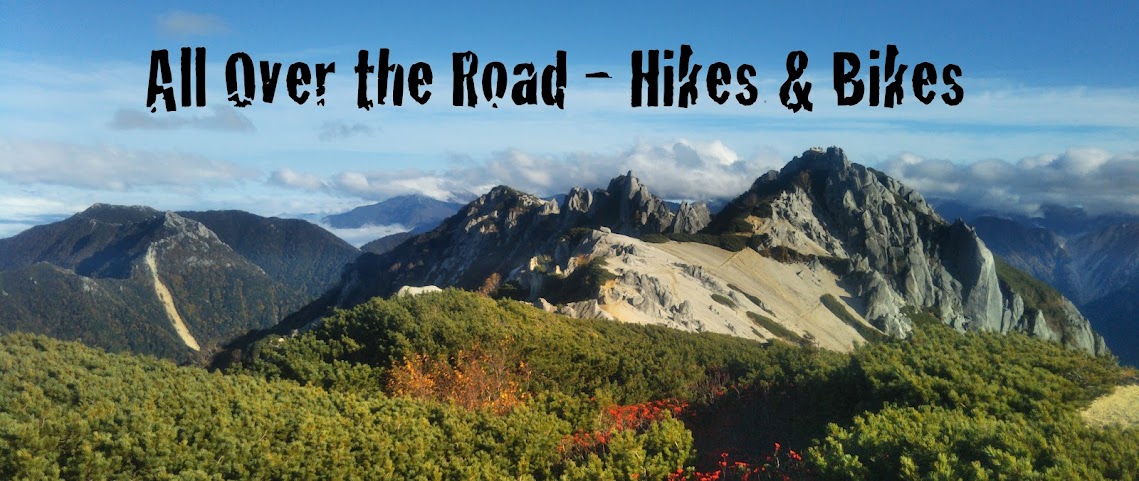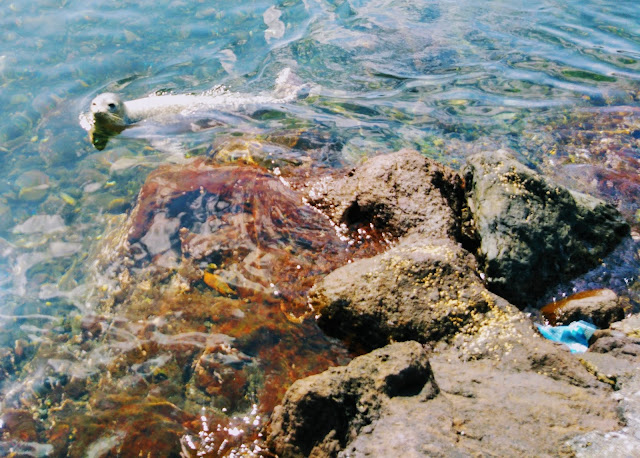Ten miles off the desolate northwestern shores of Hokkaido, Japan’s
far-flung playground of the gods, Mount Rishiri breaches the water like a beast
both heavy and buoyant. Clothed in the kind of mystery only distance can
create, Rishiri-zan, and the namesake island on which she rests, offer only
vague hints of the scars that remain after the brutal winters of eons and the
mountain’s volcanic past.
Having come all this way, standing now a thousand
kilometers and a world away from Tokyo, one feels compelled to venture just a
little bit further, out across the water, to discover those secrets behind the
haze lest the journey feel forever incomplete.
That's how I felt, there at the edge of the water.
I would not have come even this far if it weren’t for Ken,
the very active owner of a cycling tour company. I’d emailed him a couple of
years prior, to ask if he could use another guide here and there. As our ferry
neared Rishiri’s port of Oshidomari I shaded my eyes and took in the
detail-rich view, laughing quietly at my stupid, extraordinary luck.
Rishiri-zan’s low-lying conical physique is marked by rugged
slopes and a rocky, pointed peak. From far away the sea seemed to lap right up
against the mountainsides. Closer in the tree-covered slab of rock on which she
rests comes clearly into view. Rishiri-zan’s distinct, angular gorges are clothed in thick
green forest. Lower valleys cut through the pedestal below, running to the
shoreline under sleek and lofty bridges.
“We’ll be riding there this afternoon,” Ken told me, pointing
to those pearl-white elevated roadways. The air of excitement in his voice was more for me than for
himself. Ken wanted his crew to enjoy the tour every bit as much as his paying
customers, just as long as we kept abreast of our few clear responsibilities.
Ken was, in my mind, the perfect boss.
We’d woken up before dawn; three guides and eighteen guests.
After a bleary-eyed breakfast laced with giddy anticipation we stepped out into
the crisp, quiet morning. We rode through town and along the harbor under baby
blue skies. We rolled across the ferry terminal lot and right onto the day’s
first boat. Ahead of us was a 63-kilometer ride around the perimeter of the
island, the last day of riding on what had been a gloriously sunny two weeks. “I
want you to ride the whole route today,” Ken told me. “Daisuke and I will take
turns driving the van.”
Definitely my kind of boss.
Oshidomari Port, since it’s a port, involves a whole lot of
concrete and pavement. But it doesn’t take long to cycle through town and up a
hilly side street to the bike path that runs around the northern half of the
island.
From time to time I find myself in a place I would liken to
Heaven on Earth. Today was one of those times. Once again I began laughing out
loud.
Ponmoshiri Island is a rocky, uninhabited natural shrine.
That’s how I see it at least.
Rebun Island, five miles or so across the water, is Rishiri
Island’s long, skinny, flatland twin. Together, along with that desolate strip of
Hokkaido’s northwestern coastline, they make up Japan’s aptly if
unimaginatively named Rishiri-Rebun-Sarobetsu National Park.
For a while we rolled along through the lush quietude, in
view of the sea and, apparently, in danger of being crapped on by the avian
locals.
This cycling road has its own number. For a time it runs
inland, showing off Rishiri-zan’s rugged beauty while highlighting the idea
that there’s much more flatland here than the view from the mainland suggests.
Away from the shoreline the threat of seagull poop is
replaced with the evident dangers posed by aggressive, bug-eyed crows.
Along the curving northwest there’s little disrupting the
natural state of things. I did spot a couple of homes that looked like little
more than sheds, perched on the crest of the land, facing nothing but the wide
open sea and, in winter, I had to surmise, fierce and bitter Siberian winds.
This place is beautiful. But damn.
On this September day the seas were quiet, a pelagic, deep blue eternity inviting dreams of flying over the horizon to see what might
lie beyond. The rocky shore held pockets of mankind here and there. Crystal clean
water poured forth from underground streams. Sea lions played in fenced-off
environs. Someone’s laundry flapped and rustled in the breeze.
A man of few words and indiscernible thoughts sold sweet
bread from under a canopy. Cobalt blue fishing nets lie in the sun to dry,
overlooked by the red and white of a lighthouse, bold against the softer blues
of the backdrop of heaven. Signs told of artificial boundaries that, in a place
like this, seem superfluous at best.
Up ahead was one of the day’s designated stops, Otatomari
Pond. Here were wide and pretty views of the south face of Rishiri-zan, made
famous as the symbol of a certain popular local cookie. Naturally, one could
also buy a box or two of these cookies in the gift shop, while right next door
one could avail oneself of any of a variety of locally-sourced and grilled
seafood.
But a few miles short of Otatomari Pond, at the bottom of a
long hill, was this sign. Out front was a small dirt parking lot, for six cars
at best. Beyond, down a short trail through a grove of trees, lay a marshy
wonderland that, I would later decide, was much more deserving of being
featured on a box of cookies.
We rolled around Rishiri’s southeastern arc, one and two at
a time now, each of us having taken the island at our own satisfying pace. The undulating
road slowly rose, into the trees and above the now-unseen ocean. When we hit
the first of those sleek white bridges the sea came back into view, inverted
triangles of pale blue spread out beyond those long narrow canyons.
Before long Oshidomari Port appeared again, marked by the
high rounded peak of Peshi Cape. Our path wound back down, through the trees
and toward our hotel at the edge of town.
Tomorrow we’d enjoy a free day, to take in as each of us
pleased. Some wanted to ride around the island once more, perhaps in the other
direction for a different perspective on a place that our guests would likely
never see again.
I thought about riding with them. But I heard Rishiri-zan’s
rocky peak calling me, coaxing me toward the trailhead up the road.
And frankly, I didn't know for sure whether I’d ever be back
here either.






















No comments:
Post a Comment